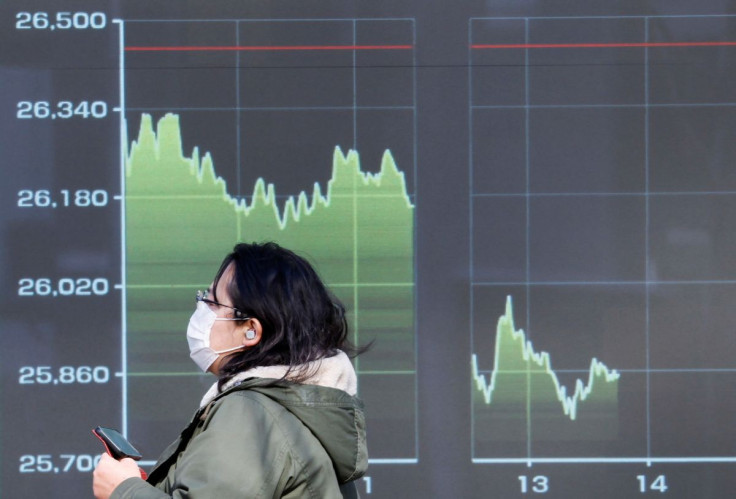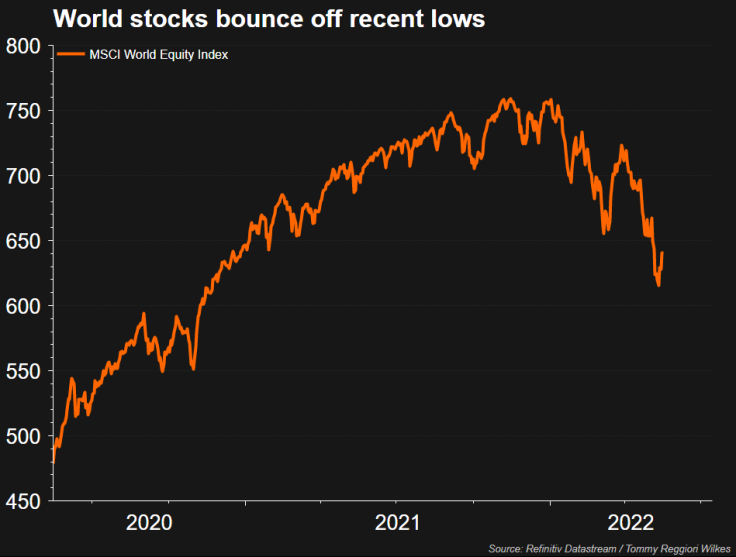Dollar Gains As Inflation Fears Spark Stock Rout

Global stocks tanked and the dollar strengthened on Wednesday as concerns about economic growth and rising inflation soured sentiment.
The mood was underscored by a 9% surge in British consumer prices and a faster-than-expected acceleration in Canada.
British inflation surged to its highest annual rate since 1982 as energy bills soared, while Canadian inflation rose to 6.8% last month, largely driven by rising food and shelter prices, Statistics Canada data showed.
British inflation is now the highest among major economies but prices are rapidly rising worldwide, forcing central banks to hike interest rates despite their likely impact on growth as suggested by a modest decline in U.S. homebuilding in April.
Soaring prices and material shortages have already hit homebuilding, the sector of the economy most sensitive to rates. But the U.S. Commerce Department report also showed a record backlog of houses to be constructed, indicating a decline in homebuilding potentially might be marginal.
Adding to the gloom caused by inflation were earnings results from Target Corp, whose quarterly profit halved as it warned of a bigger margin hit this year due to rising fuel and freight costs.
Target shares plunged 27% a day after Walmart Inc warned of similar margin squeezes.
"The market is still headed lower into this summer for the reasons that we're seeing with these big box retailers. We still have an inflation problem," said Andrew Slimmon, a senior portfolio manager at Morgan Stanley Investment Management.
By year end the S&P 500 will be closer to 5,000 than 4,000, he said, but "we're not through the tough part yet because the Fed has only raised rates 75 basis points. They've got more to go and when the Fed is tightening, the tide goes out for risk assets."
MSCI's gauge of stocks across the globe shed 2.54%, while in Europe, the pan-regional STOXX 600 index closed down 1.14%.
On Wall Street, the Dow Jones Industrial Average fell 3.34%, the S&P 500 lost 3.79% and the Nasdaq Composite dropped 4.47%.
Few analysts are willing to predict the end to selling after a bruising first five months of the year for risk assets given the magnitude of macroeconomic uncertainty.
"Investor sentiment and confidence remain shaky, and as a result, we are likely to see volatile and choppy markets until we get further clarity on the 3Rs -- rates, recession and risk," said Mark Haefele, chief investment officer at UBS Global Wealth Management.
But Garrett Melson, portfolio strategist at Natixis Investment Managers Solutions, said the outlook does not warrant fears of rolling into a stagflation-recession environment.
"The consumer balance sheet is still very healthy, corporate balance sheets are still healthy, they're investing in their businesses. Even state and local governments are very healthy in terms of their surpluses," Melson said.
"So there are a lot more growth catalysts out there than the markets are appreciating right now."
The U.S. dollar edged higher, on pace to snap a three-session losing streak, a day after Fed Chair Jerome Powell pledged the U.S. central bank would ratchet up rates as high as needed to combat rising inflation.
The dollar index rose 0.426%, with the euro down 0.67% to $1.0476. The Japanese yen strengthened 1.01% to 128.07 per dollar.
Treasury yields fell. A steep path for rates remained the prevailing market consensus as the benchmark 10-year note yield hit a one-week high of 3.015% after Powell's hawkish comments.
The yield fell 8.1 basis points to 2.890% on Wednesday after a soft U.S. housing starts number.
The German 2-year government bond yield shot to its highest since December 2011 after more hawkish central banker comments. The European Central Bank's Klaas Knot said on Tuesday that a 50 basis point rate hike in July was possible if inflation broadens.
Gold prices were little changed as looming U.S. interest rate hikes and a resurgent dollar dimmed the metal's shine.
Spot gold added 0.1% to $1,815.83 an ounce.
Oil prices dipped in volatile trade as markets weighed expectations that China will ease COVID-19 restrictions against an unexpected fall in U.S. crude stockpiles as refineries processed more crude.
U.S. crude fell 1.54% to $110.67 per barrel and Brent was at $110.28, down 1.47% on the day.
MSCI's broadest index of Asia-Pacific shares outside Japan rose 0.68% and is on its longest winning streak since February. Japan's Nikkei rose 0.94% and miners led Australian shares about 1% higher.
Graphic - MSCI World equity index:

© Copyright Thomson Reuters 2024. All rights reserved.




















